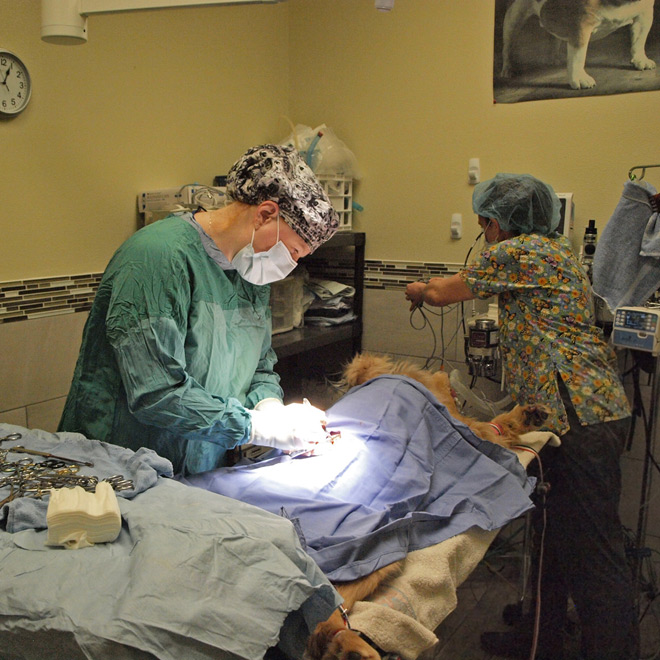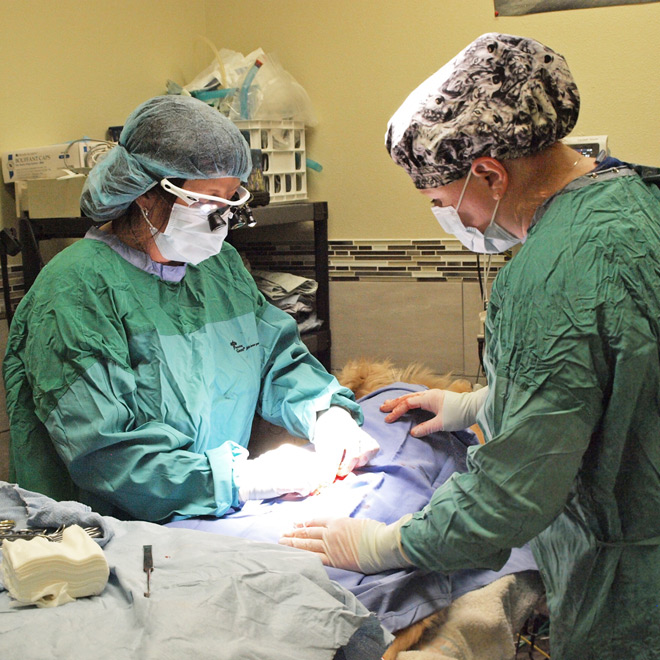Surgery at Highland Pet Hospital

Undergoing a surgical procedure is one of the biggest decisions that you as a pet owner can make for your pet. It is essential that you choose the facility and procedure carefully so the outcome can be the best possible.
At our hospital, prior to any sedative or anesthetic procedure, your pet will have a comprehensive physical examination by a doctor. This will include taking their temperature, listening to their heart and lungs, feeling the abdomen, checking the teeth, and examining your pet for abnormalities you have brought to our attention.
A presurgical laboratory panel is INCLUDED for all pets. For all dogs and apparently healthy adult cats includes a Complete blood Count (white and red blood cell count, platelet count), blood clotting time, and internal organ function screen (protein, kidney, liver tests and electrolytes). This test can be done in our hospital the morning of the procedure. Testing only requires 5 cc of blood (about 1 teaspoon) and takes about 15 minutes. For kittens or adult cats with inflammation in the mouth, a Feline Leukemia/ FIV test will be substituted as the included lab testing.
A presurgical EKG (electrocardiogram) will be run to evaluate your pet’s heart function. This will minimize possible cardiac-related anesthetic complications.
Anesthesia is maintained with either oxygen with Isoflurane or Sevoflurane, the safest anesthetics currently available for your pet. This is included in the price of spays, dog neuters, dentals, and declaws. The anesthetic gas is delivered along with oxygen through an endotracheal tube to ensure your pet breathes well under anesthesia. While under anesthesia, your pet will be monitored at all times by a trained veterinary assistant. To ensure your pet’s heart and lungs are functioning correctly under anesthesia your pet will be monitored with a pulse oximeter to measure heart rate, respiratory rate, and oxygenation of the blood (sPO2 and CO2), temperature, and blood pressure. While under anesthesia, your pet will receive Intravenous (IV) fluids to maintain good circulation. Your pet will also receive thermal support during this critical time to assure their body temperature is maintained at a safe level.
Prior to the procedure, your pet will have a surgical shave and a surgical scrub at the area of the incision. During surgery, the doctor will perform the procedure with a sterile surgical pack wearing sterile gloves to protect against infection.

During your pet’s recovery, he or she will be monitored frequently by a trained assistant to be sure they are recovering from anesthesia safely. Your pet may stay overnight if determined by the doctor that it is in their best interests. Your pet will be checked during the evening to assure their recovery is progressing normally. We routinely keep pets overnight that have had major or abdominal procedures performed, including spays. Declawed cats also stay overnight for post-op bandage care. Your pet will be recovered in a confined area on a blanket. When ready, they will receive a meal of palatable soft food.
Post-operative pain medication will also be provided for all surgeries except dental cleanings without extractions. This will be administered by injection pre-op and will be dispensed to continue at home with oral medication for several days. After surgery, we will be in contact with you to update you on your pet’s surgical outcome.
While every anesthetic procedure has some inherent risk, our doctors and staff will make every effort to make your pet’s anesthesia and surgery as safe and stressfree as possible for you and your pet.
Thanks to Dr. Marty Greer for sharing this valuable content from her Breeder’s Library
Her book “Canine Reproduction & Neonatology” is invaluable to breeders and is available on Amazon.


 Tap to Call Now
Tap to Call Now